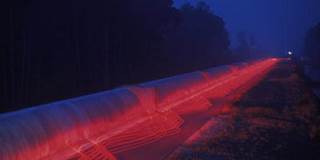Last September, researchers detected an exceptionally weak signal that lasted for about a tenth of a second: the gentle chirp of a gravitational wave. This feat, which confirmed a prediction made by Albert Einstein 100 years ago, is worthy of the Nobel prize.
GÖTEBORG – A long time ago in a galaxy far, far away, two enormous black holes – each with a mass roughly 30 times larger than that of the sun – collided and merged, sending out a short, powerful blast of gravitational waves. The energy from the blast spread across the universe at the speed of light, diluting its power into the immense vastness of space.
More than a billion years later, the energy from the blast reached Earth as an incredibly weak signal, lasting for about a tenth of a second. On September 14, 2015, scientists from the Laser Interferometer Gravitational-Wave Observatory (LIGO) in the United States detected the gravitational wave as gentle chirp on their instruments – providing the first confirmation of a prediction made by Albert Einstein 100 years earlier.
LIGO, which operates under the direction of the US National Science Foundation, uses two advanced interferometers. These high-tech wonders, located at opposite ends of the country and put into operation shortly before the successful measurement of the gravitational wave (known as GW150914), operate using the principle of light interference. They detect the strains in space/time geometry induced by gravitational waves by measuring alterations in the arm-lengths of the interferometers. In the case of GW150914, the length changed by less than one-thousandth of the size of a proton.

GÖTEBORG – A long time ago in a galaxy far, far away, two enormous black holes – each with a mass roughly 30 times larger than that of the sun – collided and merged, sending out a short, powerful blast of gravitational waves. The energy from the blast spread across the universe at the speed of light, diluting its power into the immense vastness of space.
More than a billion years later, the energy from the blast reached Earth as an incredibly weak signal, lasting for about a tenth of a second. On September 14, 2015, scientists from the Laser Interferometer Gravitational-Wave Observatory (LIGO) in the United States detected the gravitational wave as gentle chirp on their instruments – providing the first confirmation of a prediction made by Albert Einstein 100 years earlier.
LIGO, which operates under the direction of the US National Science Foundation, uses two advanced interferometers. These high-tech wonders, located at opposite ends of the country and put into operation shortly before the successful measurement of the gravitational wave (known as GW150914), operate using the principle of light interference. They detect the strains in space/time geometry induced by gravitational waves by measuring alterations in the arm-lengths of the interferometers. In the case of GW150914, the length changed by less than one-thousandth of the size of a proton.